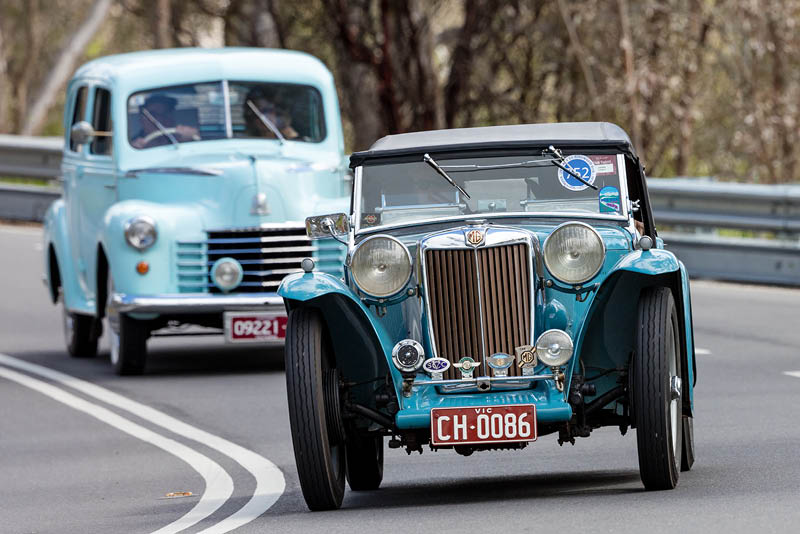If you’re a fellow classic car lover, by now you are probably familiar with club rego – but how does it all work, and what are the rules that surround it?
Unsurprisingly, it’s not just the revheads that love the iconic vehicles of yesteryear. Iconic cars don’t only appeal to car lovers, but also attract those passionate about engineering, design, art and yes, history. Before cars were built for efficiency and speed, it was about the experience, style, exclusivity and ultimately, craftsmanship – making them timeless, works of art.
The appeal of classic cars vary depending on who you talk to. For some, it’s a bucket list item, while for others, it’s an investment opportunity. Regardless, one of the better known “perks” of owning one is access to club rego.
Understanding Club Registration
Classic cars, or vehicles usually older than 25 years, are usually eligible for “special interest” or club registration. These types of vehicle regos can offer a hefty discount on standard vehicle registration fees in Australia, particularly if your car holds a V6 or V8 engine.
However, there are generally quite a few terms and conditions that apply to this scheme, in order to ensure that access to club rego is only for those who genuinely qualify for it. Although the rules vary between each state, the good news is that if you’re a legitimate classic car enthusiast, the hoops you need to jump through do pay off in the long run – so how does it all work?
Queensland
Known as the “special interest vehicle concession scheme”, eligibility in Queensland for club rego covers vehicles that are at least 30 years old, with the exception being for heavy buses over 25 years of age.
The legalities of the scheme stipulate that the registered vehicle must not be used for general day to day purposes, such as commuting to and from work. Unfortunately, “for hire or reward” is also not permitted on Queensland club rego, so forget about potential side hustles like weddings and formals. However, the vehicle in question can be used in unique rallies or events specifically linked to your club of choice, which makes the $220 a year club rego attractive for classic car lovers residing in the Sunshine State.
New South Wales
In order for a vehicle to be registered under the “historic” or “classic” vehicle schemes in New South Wales, it first needs to be over 30 years of age, along with being a member of a state recognised car club. As long as an official invitation has been tendered, owners are welcome to use their classic car to attend events and rallies organised by the affiliated club.
A recent change to the scheme was welcomed by classic car owners, which introduced a new rule that allows the classic car to have 60 days of general road use per year. The only stipulation to this change is that owners must carry a log book and note each trip, making the beloved Sunday drive suddenly much more appealing.
In New South Wales, regular registration and CTP (green slip) are completed separately. For vehicles between 1,505kg and 2,504kg, private rego is $474, plus a yearly fee of $67, and green slips vary anywhere from $400-$500. Compare this with club rego, and you’ll need to pay about $70 in plate and admin fees, plus any CTP (which is obtained separately and varies).
Victoria
The Victorian club permit scheme is slightly more favourable than Queensland or New South Wales, as it allows vehicles older than 25 years of age as opposed to 30. Much like the above, owners must join a VicRoads approved car club to qualify, and carry a log book at all times. The logbook is used in conjunction with either a 45 or 90 day permit – this is 45 or 90 times you use your car, which must be logged.
The 90-day fee is $153.80, while the 45-day fee is $79.60, and these fees include the TAC, permit fee and logbook fee. When compared to other states, the Victorian club rego scheme is regarded as a much more simple, straightforward and liberal system. Regular car registration is administered this way too, with a flat fee of $834.80 per year for metropolitan areas, $779.80 for outer metro, and $716 for rural areas.
Tasmania
Unsurprisingly, access to club rego on the Apple Isle is only for vehicles older than 30 years of age. One key difference to note though is that the vehicle must also be in “exceptional condition” both inside and out, meaning it must be original, restored or modified. On the flip side, owners don’t need to be a member of a car club to access the special vehicle registration scheme, and owners can instead purchase varying registration lengths.
Club rego in Tasmania is quite straightforward, with 104 days in a 12 month period costing $213.39 to establish a new vehicle, or $191.52 to renew, with a gross vehicle mass no greater than three tonnes. When compared to the standard registration price of $622.52 for a six cylinder vehicle, it works out to be significantly cheaper. The only catch is that in order to access club rego rates, residents must continue to have another fully registered vehicle in their name, meaning that a classic car isn’t allowed to be your only vehicle.
South Australia
To qualify for club rego in South Australia, classic cars must be older than 30 years. Vehicles that are left hand drive and street rods made before 1949 are also eligible, but owners must be a financial member of a car club as well. The simplified process includes a 90 day registration, with days driven to be logged in a logbook. Much like Queensland, owners are not permitted to use the vehicle “for hire or reward”, meaning no using the car for weddings or formals.
A relatively new amendment to the club rego scheme in this state is that rather than offer a special registration bracket, the South Australian government has opted to waive the registration fee altogether. Instead, consumers just have to pay for CTP insurance, administration fees and a reduced emergency services levy which usually amounts to around $200 in total per annum. To compare, full registration on a standard six cylinder vehicle costs around $781 per year, so it’s still quite a significant saving.
Western Australia
True to form, things are done a little differently in Western Australia. Vehicle registration is calculated by paying per 100kg of tare mass, which works out to be around $23.64 per 100kg for a regular car including CTP.
In September 2020, Premier Mark McGowan announced the introduction of the “Concessions For Classics” vehicle registration scheme. Newly operational in 2021, the scheme offers a 75% registration discount (and discounted motor injury insurance) to members of an approved car club that drive vehicles or bikes manufactured prior to 1990 – meaning that a 1,500kg classic vehicle could cost as little as around $88.65 to register per year.
Additionally, Western Australia also operates the “Code 404” concessional licence scheme. Under the scheme, any vehicle aged 25 years or older may be eligible. Vehicles must be unmodified, and fit into one of four criteria – “Veteran”, “Vintage”, “Post-Vintage”, and “Invitation Class”. 404 licensing reportedly costs $73 per year with no logbook required, but users may face stricter eligibility criteria including that owners must be a member of a 404-approved club.
Australian Capital Territory
Accessing club rego in the ACT is via the VVH (Veteran, Vintage and Historic) scheme, providing your vehicle is older than 30 years of age and you’re a member of an eligible car club. Under the VVH, classic car owners can participate in events organised or approved by eligible clubs, operate test runs up to a 40km radius, and use your vehicle for specific events like weddings and formals so long as you obtain permission from the car club first.
VVH club registration can cost as little as $117 per year, with the primary stipulation being that the car in question doesn’t do any more than 2,000 miles or 3,000km per year. When compared to regular vehicle registration that costs anywhere between $631 and $717 per year including CTP insurance, VVH club rego packs quite the punch when it comes to potential savings.
Northern Territory
Like many other states, in order to access club rego in the Northern Territory, car lovers must be registered with a recognised car club – which there are only ten of. Unsurprisingly, your vehicle must also be at least 30 years of age or a recognised “street rod” to qualify. Club registration costs as little as $127 per annum including CTP insurance, which is significantly cheaper than the estimate for a standard six cylinder car registration at around $912 per year.
Under car club registration, owners can’t use the vehicle to commute to and from work, or commercial enterprises such as such formals or weddings. However, limited personal use is permitted providing owners keep a logbook and only use the vehicle for approved on-road activities. The registered vehicle may only be used on the road for up to 90 days per annum – 60 for club events, and 30 for maintenance, test driving and restricted personal use purposes.
Understanding The Fine Print Of Club Rego
If you’re looking at selling your classic car or vehicle, in many states it’s not possible to transfer ownership of club registration and plates. Owners will have to de-register the car in question from club plates, and re-register on normal registration, or sell the car unregistered and let the buyer figure it out (they’ll need to either get temporary registration or tow the car to get it home). In states that do allow transfers, both parties will need to be part of an eligible club. Needless to say, make sure that you dot your i’s and cross your t’s when it comes to finance and insurance options too.

